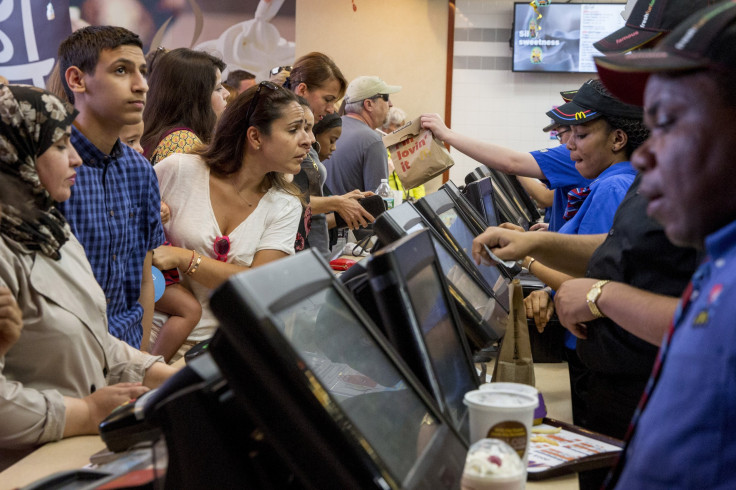When Sick, Most Food Service Employees Go To Work Anyway

Christine Gnecco, 28, has been sick at least seven times over the last couple of years -- “two rounds of pink eye, one round of stomach virus and probably four or five upper respiratory infections.” In each case, she’s gone to work, taking orders and serving food at Olive Garden restaurants in Erie and Greensburg, Pennsylvania.
“It’s very expensive to skip work, because we don’t get paid if we’re not at work,” says Gnecco. “I guess it feels like I’m walking away from $150.” (That's what she earns for a typical lunch or dinner shift.)
“You wash your hands constantly, you use hand sanitizer, you try to be very careful not to breathe on the food and of course, too, always avoid sneezing on the food or whatever, but it does feel like ‘I’m going to get someone sick by being at work today,’ and that’s definitely concerning.”
Last winter, an outbreak of pink eye spread quickly among Gnecco and her co-workers. It remains less clear whether she has passed along any of her recent maladies to patrons. “Not that I know of,” she says. “I haven’t gotten any feedback from customers.”
Gnecco’s conduct may seem alarming, gross, risky -- maybe even negligent. In fact, it is remarkably common. According to polling data provided to International Business Times, a majority of food service workers -- 51 percent -- say they go to work “always” or “frequently” when sick. The finding is part of a larger study conducted by the Center for Research and Public Policy for Alchemy Systems, a Texas-based company that consults major farming and food corporations on safety issues. The report echoes prior surveys on the topic.
Of course, the health risk posed by a sick worker depends on the illness. But in general, it’s a problem anytime someone with a contagious sickness is “handling ready-to-eat meals,” says Martin Bucknavage, a food safety expert at Pennsylvania State University.
Among the most serious are Hepatitis A, salmonella and norovirus, especially the latter. Just a handful of particles can spread the virus. All it takes is for a server with norovirus to not wash her hands correctly -- the food she touches can quickly become contaminated, spreading the infection to unsuspecting customers.
Restaurant workers have almost certainly triggered a number of recent high-profile outbreaks. In August, 80 customers and 18 employees at a Ventura County, California Chipotle restaurant fell ill with norovirus; in 2012, 90 people suffered from an outbreak at an Indiana Subway; and nearly a decade ago, nearly 400 patrons of an Olive Garden outside Indianapolis contracted the virus.
According to the Centers for Disease Control and Prevention, infected food workers cause about 70 percent of reported norovirus outbreaks from contaminated food. About 20 million Americans fall sick from the virus every year.
Low Pay And No Paid Sick Leave
Jay Neal, a professor in the college of hotel and restaurant management at the University of Houston, says he isn’t surprised so many food service workers are showing up sick. “People in the food safety community have been talking about this for years,” he says.
That’s in large part because, like Christine Gnecco, many restaurant workers can't absorb the economic cost of staying home. According to the survey, forty-seven percent of those who work sick said they did so because they couldn’t afford to lose pay.
Food service workers are among the lowest paid in the country. Median annual earnings for “combined food preparation and serving workers, including fast food,” according to the Bureau of Labor Statistics, are $18,540. Waiters and waitresses take home median pay of $18,680.
And as in other low-paid occupations, paid sick leave is exceedingly rare. McDonald’s Corporation raised eyebrows by unveiling a compensated leave plan earlier this year, but the benefits are meager: An employee working an average of 20 hours a week can accrue 20 hours of paid leave in a year; it applies only to corporate-owned locations, about a tenth of the total restaurants nationwide.
McDonald’s, Starbucks, Burger King, Darden, which owns Olive Garden, and Yum Brands, which owns KFC, Taco Bell and Pizza Hut, did not respond to requests for comment.
Neal also says the problem stems from tight scheduling practices. Restaurant managers often do not have another person who can easily replace an employee who catches something before a shift. And since many bosses don't take the safety hazards of a sick worker as seriously as they ought to, they don’t encourage that employee who feels a bit woozy to stay home.
Food workers also worry about the burden a potential absence puts on their fellow employees. According to the study, fifty percent said they showed up sick because they didn’t want to let co-workers down.
“A lot of them have a deep sense of loyalty to their job, not necessarily to the leadership, but to the team, their co-workers,” says Neal.
Bucknavage, the food safety expert at Pennsylvania State University, says restaurants should improve training programs to better communicate the hazards of working sick near food. He also says paid sick leave could be an option.
“It’s something that needs to be considered,” he says. “The question is how do you incentivize somebody to stay home when they’re ill? It’s certainly a strategy to do it.”
© Copyright IBTimes 2024. All rights reserved.






















